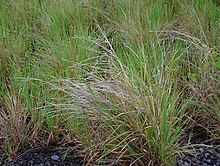Heteropogon contortus is a tropical, perennial tussock grass with a native distribution encompassing Southern Africa, southern Asia, Northern Australia, Oceania, and southwestern North America. The species has also become a naturalised weed in tropical and subtropical regions in the Americas and East Asia. The plant grows to 1.5 metres (4.9 ft) in height and is favoured in most environments by frequent burning. The plants develop characteristic dark seeds with a single long awn at one end and a sharp spike at the other. The awn becomes twisted when dry and straightens when moistened, and in combination with the spike is capable of drilling the seed into the soil.
| Heteropogon contortus | |
|---|---|
 | |
| Scientific classification | |
| Kingdom: | Plantae |
| Clade: | Tracheophytes |
| Clade: | Angiosperms |
| Clade: | Monocots |
| Clade: | Commelinids |
| Order: | Poales |
| Family: | Poaceae |
| Subfamily: | Panicoideae |
| Genus: | Heteropogon |
| Species: | H. contortus |
| Binomial name | |
| Heteropogon contortus | |
| Synonyms[1] | |
| |
The species is known by many common names, including black speargrass, tanglehead, steekgras (in Afrikaans) and pili (in Hawaiian, ultimately from Proto-Austronesian *pilit₁ "to adhere/stick").[2][3] H. contortus is a valuable pasture species across much of its range. However, it has also been responsible for the elimination of the wool industry over much of Australia due to the seeds becoming embedded in the wool and skin of sheep and devaluing the wool and killing the animals. H. contortus seeds are also responsible for similar injuries in dogs with thick undercoats, or becoming embedded in the socks and skin of hikers.
Uses
Native Hawaiians used pili to thatch hale (houses).[4] Ruler Pilikaʻaiea was named after the grass, and his royal house was Pili line (Hale o Pili).
Gallery
- Single seed demonstrating long twisted awn
- Ripe seedhead
- Form
See also
References
External links
Wikiwand in your browser!
Seamless Wikipedia browsing. On steroids.
Every time you click a link to Wikipedia, Wiktionary or Wikiquote in your browser's search results, it will show the modern Wikiwand interface.
Wikiwand extension is a five stars, simple, with minimum permission required to keep your browsing private, safe and transparent.



